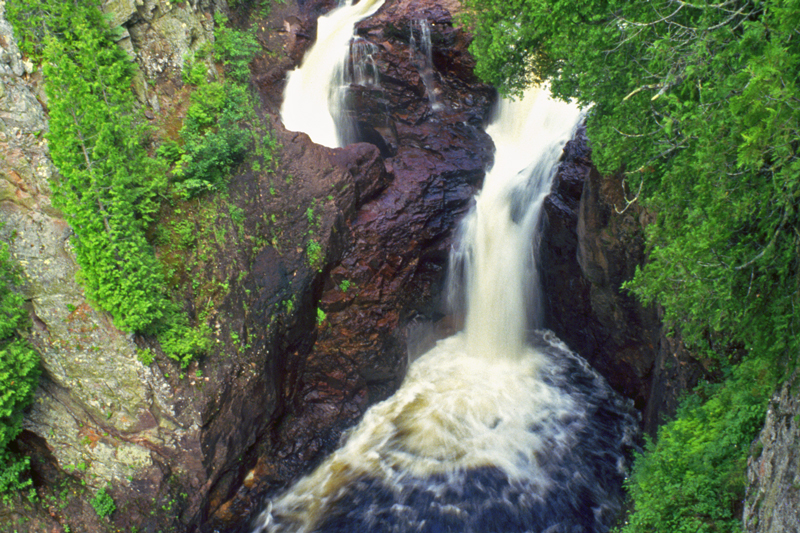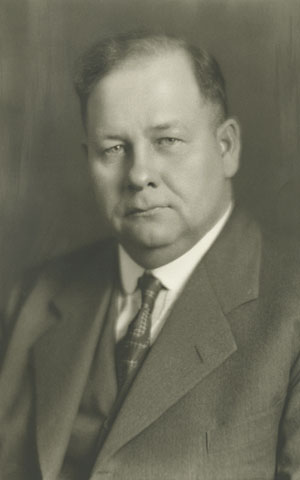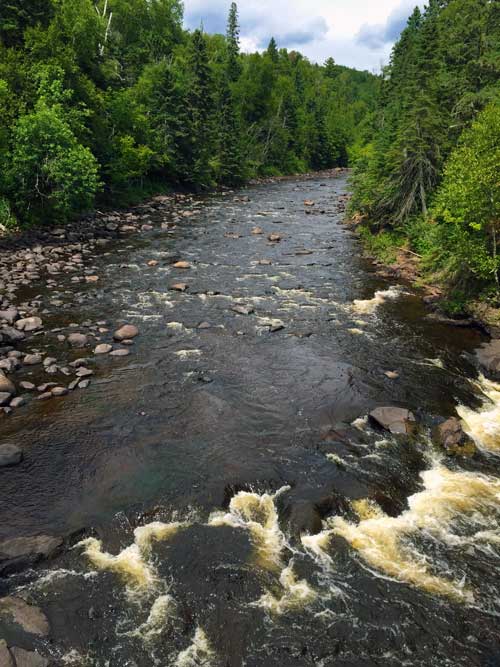We meet today to dedicate this beautiful park in honor of a great man. It has been so ordained by our legislature in the 1963 session. Chosen one of the hundred great men of Minnesota in 1947, Judge Magney could easily have been so designated for a number of reasons, but so far as this occasion is concerned his greatness in the field of conservation is what brings us here today. In that field he might well have been designated the father of our public parks in this state.
No one is more deserving of the honor we today bestow posthumously on him than Judge Magney. It is not for us at this time to extol his virtues as a lawyer or a judge of the trial court or a justice and commissioner of the Supreme Court over a period of more than forty years. That remains to be done at another appropriate time and place.
Born as he was the son of humble parents, Judge Magney early learned that all people are not endowed with the same share of the nation’s wealth and that those who lack the means of providing for themselves what they desire must often look to the public to provide it for them. He grew up in a religious atmosphere. His father, the first student at Gustavus Adolphus College, then just having its beginning, served pastorate’s in a number of communities in and near the St. Croix Valley. Judge Magney loved nothing better than to take a Sunday drive over the area where he grew up and where his father served as pastor; the beautiful St. Croix Valley, where he was born; Amery, Wisconsin, where he lived part of his youth; Bayport and Center City, where the family was at times; and during those trips he would talk about his early life and his aspirations to do something for those who were less fortunate than others. Having finished Gustavus Adolphus College in 1903, he entered Harvard Law School, from which he received his law degree in 1908. He then settled in Duluth to practice law. Probably providentially, his first lawsuit – a forest fire case – took him to Grand Marais, then accessible mainly by boat. He fell in love with the grandeur of the North Shore scenery, a love that grew with the years and n ever left him. Elected mayor of Duluth in 1917, he set about establishing one of the fine park systems of the state – acting as his own park commissioner. He was instrumental in doubling the size of Jay Cooke Park, which he felt was one of the fine parks of the state, but his main efforts finally came to rest on his beloved North Shore, where he early recognized that if the public was to be able to enjoy any of the beautiful sights nature had made available to all it was essential that the public acquire some of thesesights while they were yet available. And so it was that through his efforts, aided by many others who felt as he did, the public today enjoys Gooseberry State Park; the beauties of Kodonce; Split Rock; Baptism River; Bois Brule; Berglund; Devil’s Track, and many others. He did not confine his efforts, however, to his North Shore. He helped establish the Minnesota Council of State Parks, of which he was president from its inception in 1954 until his death. I think the statement of principles of that council which he helped draft states better than anything I can say his philosophy about parks owned by the state. Part of it reads:
“It is the belief of the Council that the state park system is important in more than one respect. In the first place, our state parks are everyman’s country estate, giving him the privilege of enjoying nature such as only those of considerable means might afford. The man of means provides his own country estate, but the average man is so situated financially as to be unable to do so. In dealing with the desirability and worth of our state parks to the average individual resident of this state this is a very important consideration. Our people long to get out into the open and the values to health and mind from the out-of-doors and contacts with nature are great.
“In the second place, well managed and properly developed state park and recreational areas are of a great economic value to the state. The tourist industry is our fourth largest. Nature has provided it with everything needful. Beautiful streams, lakes and forest. Any encouragement to the tourist industry must necessarily result in economic gain to the state. It is an industry with vast potentialities. One factor that can contribute a great deal to further this industry is well-managed and properly developed state parks and recreational areas. We know of no investment the state can make that will bring larger returns than such a one.”
In addition to helping establish many of the recreational areas along the North Shore, which the public now enjoys, Judge Magney was interested in many other projects. The establishment of the Fort Snelling Park was long his dream, and there were many others.
Judge Magney was a deeply religious man – not in a fanatic way that demands others accept his way of life, but in a tolerant, more practical way in which he lived his religion – no small part of which, I am sure, was his love of the outdoors. In walking the wilderness trails, which he loved to do – in seeking preservation of some of the natural beauty that was rapidly being destroyed so that others to come could enjoy it as he had, he was in a way doing missionary work for his God. The trees and flowers – the lakes and the streams – and the fish and animal inhabitants of them – these, too, he saw as the handiwork of God. I am sure that while tramping the woods he loved so much he found time for reflection which was, to him, a sort of communion with his Creator and which ultimately led to his greatness as a judge and as a man.
He was a powerful man, physically and mentally. For those of us who had the good fortune to know him as a fishing and hunting companion, it is clear that no more pleasant companion could anywhere be found, but those who tried to follow him along the Devil’s Track or some other stream soon learned that it would tax the energy of a man twenty years younger to keep up with him. I don’t think Judge Magney ever hunted in the true sense. Of the word; at least he never shot anything. But we did on a few occasions take him with us on hunting trips. He had as much enjoyment just being along with us as the rest of us had in trying to shoot some game. On one occasion we took him with us pheasant hunting near Pipestone. We placed him at the end of a cornfield and told him all he had to do was to stand there and wait as we drove through the cornfield and when we reached the end near him the chances were that some birds would fly up, and it was his duty to shoot them. He took up his stand and we ours. As we approached the end, numerous birds flew up and over him but never a shot. When we reached his end we said: “judge, how come you don’t shoot?” The judge laughed with that contagious laugh of his and replied: “I was afraid if I shot I might hit some of you rather than the birds, anyway, those birds are just too pretty to shoot.”
As a fisherman he was without a peer. He knew the lakes and streams in the border country as no one else knew them. He would go to any length to reach a beaver dam or a good trout stream, and a good day’s catch was reward enough for any hardship. At the same time, he would not take more than he could use. To take game or fish and destroy it if he had no use for it was to him a wrong and sinful. To leave some for others was his way of life, and through it all he often expressed the thought that those, young and old alike, who have never enjoyed the outdoors have missed a large part of the joy of living. His efforts to preserve for those who have learned to enjoy nature the opportunity to indulge in that enjoyment are, I believe, among the greatest contributions he made to our society and to posterity. Truly it can be said that he was a friend of man. He lived to enjoy life, but he also lived to make the enjoyment of many of the beautiful things of life available to others. He was tolerant of the views of others, but once he had made up his mind that something ought to be done he adhered to the accomplishment of what he had in mind with a determination that many of you are familiar with, and he was not easy to dissuade from the path, which he thought people ought to follow. In it all, he accomplished much, and among the most important of these accomplishments was the heritage he has left to all of us in the establishment and improvement of state parks. It is in this spirit I am sure that we dedicate this park to his memory today.
Thus, while we justly do honor to a man who has contributed so much, should we not pause for a few moments to reflect on the value of his contributions and what we who remain should do about it. The great value of our vacationland, properly established and managed as a tourist attraction, cannot be underestimated. People come here from all parts of our nation and, for that matter, from all parts of the world, to share with us the beauties with which nature has so richly endowed us. They leave much wealth and help to sustain many who are engaged in various enterprises to care for them. It is in fact one of our largest businesses. It will continue only so long as we are wise enough to protect that which nature has given us.
But aside from the economic value of our forests and lakes and stream, there is, I think, an even greater value to our own people in providing healthful, wholesome recreation and facilities that can only result in a stronger, healthier, and happier citizenry. Mechanization and automation have made possible more leisure time for large segments of our population, and more and more of our people, young and old alike, seek nature’s therapy to be found in a vacation of a week or two or sometimes a month at a lake or along the North Shore drive or elsewhere. To most of these it will always be as Magney said it was: “our state parks are everyone’s country estate.” It is the only country estate that most of them will ever know. To our youth, who are so often maligned these days, to learn to know and love nature is surely one of the cures of so-called delinquency. I have yet to know a boy, or girl for that matter, who loves to camp and hunt and fish and who is given the opportunity to do so who is much of a social problem. To all who enjoy the outdoors and can find the opportunity for fulfillment of that desire by even a short vacation, there is no better cure for the tensions that build up from our modern day pace of living. It is in helping to provide parks and facilities where these wholesome activities can find fulfillment that we can follow in the footsteps of Judge Magney and get the greatest value out of his contributions. Let us not destroy that which nature has given us but let us, instead, be wise enough to preserve what we can for those who are to follow us.
I think Judge Magney’s philosophy of living is so well stated in the poem by Sam Walter Foss that I am going to conclude by reading it to you. I am sure you are all familiar with it:
“Let me live in my house by the side of the road,
Where the race of men go by;
They are good, they are bad; they are weak, they
are strong,
Wise, foolish, – so am I;
Then why should I sit in the scorner’s seat,
Or hurl the cynic’s ban?
Let me live in my house by the side of the road,
And be a friend to man.”
Would that we could all live by this same philosophy.



